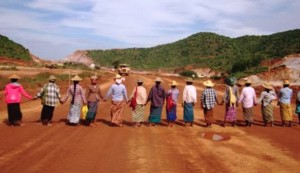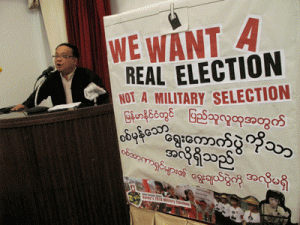Posts Tagged ‘Karen State’ (107 found)
Recent Fighting between Tatmadaw and DKBA Soldiers Leads to Killing and Displacement of Villagers in Hpa-an District
On July 8th 2015, a female villager named Naw D—, from G— village, reported to KHRG that on the evening of July 6th 2015, Tatmadaw soldiers began firing small machine guns and grenade launchers at the Democratic Karen Benevolent Army (DKBA)[2]camp in Waw Poo Bridge area, Meh Th’Waw village. Villagers who live in the villages near the location where the fighting took place have fled from their villages for their own safety […]
• • •Land Confiscation Continues Unabated Across Southeastern Burma
 On 15 July 2015, Karen Human Rights Group (KHRG) held a briefing of their latest report on land confiscation, “‘With Only our Voices, What Can We Do?’: Land Confiscation and Local Response in Southeast Myanmar,” a follow up to the 2013 report “Losing Ground.” The report provides updated information surrounding the state of land confiscation, while also documenting the emergence of new trends in the fragile post-ceasefire environment of southeastern Burma. As a means of empowering voices on the ground, KHRG’s research team has offered detailed insights into the experiences of local villagers in their ongoing struggle against the Burma Government, the Burma Army, and both foreign and local investors who have threatened their ability to live peacefully on the land they rightfully possess […]
On 15 July 2015, Karen Human Rights Group (KHRG) held a briefing of their latest report on land confiscation, “‘With Only our Voices, What Can We Do?’: Land Confiscation and Local Response in Southeast Myanmar,” a follow up to the 2013 report “Losing Ground.” The report provides updated information surrounding the state of land confiscation, while also documenting the emergence of new trends in the fragile post-ceasefire environment of southeastern Burma. As a means of empowering voices on the ground, KHRG’s research team has offered detailed insights into the experiences of local villagers in their ongoing struggle against the Burma Government, the Burma Army, and both foreign and local investors who have threatened their ability to live peacefully on the land they rightfully possess […]
Special Representative of the Secretary-General for Children and Armed Conflict, Leila Zerrougui, Concludes Her First Visit to Myanmar
The United Nations Special Representative of the Secretary-General (SRSG) for children and armed conflict, Leila Zerrougui, concluded a five-day visit to Myanmar today. Her first visit to the country, at the invitation of the Government, aimed to assess the impact of the conflict on children in accordance with United Nations Security Council resolution 1612, focusing in particular on the implementation of the Joint Action Plan (JAP) signed in 2012 by the Government and the Country Task Force on Monitoring and Reporting (CTFMR) to end and prevent the recruitment and use of children by the armed forces of Myanmar (Tatmadaw). The SRSG visited Nay Pyi Taw, Yangon, Mandalay and Myitkyina (Kachin state) […]
• • •Free and Fair Elections for Whom?
 Last week, Burma’s Union Election Commission (UEC) declared that the General Elections would be set for 8 November of this year. Having previously boycotted the 2010 election on the grounds the election rules were unfair, the opposition National League for Democracy (NLD) has agreed to contest the military-backed Union Solidarity and Development Party (USDP), who currently holds power […]
Last week, Burma’s Union Election Commission (UEC) declared that the General Elections would be set for 8 November of this year. Having previously boycotted the 2010 election on the grounds the election rules were unfair, the opposition National League for Democracy (NLD) has agreed to contest the military-backed Union Solidarity and Development Party (USDP), who currently holds power […]
Asian Highway Project Undermines Peace in Karen State
(10 July 2015) – The Karen Peace Support Network (KPSN) is alarmed by recent fighting between the Burma Army and the Democratic Karen Benevolent Army (DKBA) along the recently completed section of the Asian Highway between Myawaddy and Kawkareik. The Burma Army began heavy fire on DKBA positions along the road in the early morning of 2 July. Fighting has lasted for one week, has spread to other parts of Karen State, and tensions remain high. This is the fourth instance of armed clashes in the area in the past year, breaking out amidst rising tensions over control of the highway, which is slated to officially open later this month […]
• • •KWO Six Months Summary of Human Rights Violations in Karen State: January to June 2015
The Karen Women’s Organization (“KWO”) collected information regarding continuing serious human rights abuses perpetrated by the Burma Army in all seven districts in Karen State from January to June 2015. Our data demonstrates that the Burma Army has taken advantage of the preliminary ceasefire to continue to commit serious human rights abuses, perpetrate direct attacks on civilians and expand its presence in Karen State […]
• • •Myanmar: All Parties Must Immediately Halt Child Recruitment and Use
London, 2 July 2015 – The Myanmar military and the Kachin Independence Army (KIA) should immediately end the recruitment and use of children under the age of 18 years and release all those recruited under-18 within their ranks, Child Soldiers International said in new research released today […]
• • •PEACE Update: Myanmar Peace Process ( 1 June – 3 July 2015)
2-9 June 2015: Ethnic Leaders’ Summit (Law Khee Lar, Karen State). Leaders of Ethnic Armed Organizations (EAOs) have declined to sign the Nationwide Ceasefire Agreement (NCA) in its present form and outlined the following changes to the March 2015 draft NCA. See the attached report, “Summit of the Top Leaders of Ethnic Armed Organizations, Resolutions and Minutes” for details […]
• • •‘With Only Our Voices, What Can We Do?’: Land Confiscation and Local Response in Southeast Myanmar
ORCHID HOTEL, YANGON – Three years after the 2012 preliminary ceasefire negotiations between the Myanmar government and the Karen National Union (KNU), reported instances of land confiscation continue to increase in southeast Myanmar […]
• • •‘With Only Our Voices, What Can We Do?’: Land Confiscation and Local Response in Southeast Myanmar
 ORCHID HOTEL, YANGON – Three years after the 2012 preliminary ceasefire negotiations between the Myanmar government and the Karen National Union (KNU), reported instances of land confiscation continue to increase in southeast Myanmar. In the 2015 report, ‘With only our voices, what can we do?’, KHRG highlights four main land use types which lead to land confiscation, including infrastructure projects, natural resource extraction, commercial agriculture projects, and military activities. Based on testimony from local villagers, the Myanmar government; domestic corporate actors; and Tatmadaw and Karen ethnic armed groups (EAGs) are all identified as being complicit in the confiscation of land from local communities in southeast Myanmar. However, local villagers report using a variety of strategies to prevent and mitigate the impacts of land confiscation, such as reaching out to civil society organisations (CSOs) and the media, negotiating with actors involved in projects, and lobbying both the Myanmar government and Karen EAGs […]
ORCHID HOTEL, YANGON – Three years after the 2012 preliminary ceasefire negotiations between the Myanmar government and the Karen National Union (KNU), reported instances of land confiscation continue to increase in southeast Myanmar. In the 2015 report, ‘With only our voices, what can we do?’, KHRG highlights four main land use types which lead to land confiscation, including infrastructure projects, natural resource extraction, commercial agriculture projects, and military activities. Based on testimony from local villagers, the Myanmar government; domestic corporate actors; and Tatmadaw and Karen ethnic armed groups (EAGs) are all identified as being complicit in the confiscation of land from local communities in southeast Myanmar. However, local villagers report using a variety of strategies to prevent and mitigate the impacts of land confiscation, such as reaching out to civil society organisations (CSOs) and the media, negotiating with actors involved in projects, and lobbying both the Myanmar government and Karen EAGs […]









 All posts
All posts